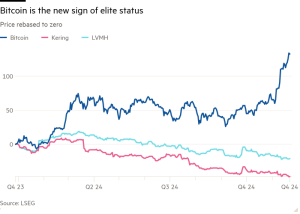Boris Johnson and the bestseller trick
Stay informed with free updates
Simply sign up to the Life & Arts myFT Digest — delivered directly to your inbox.
Magician, illusionist, clown — over the years Boris Johnson has been called them all, thanks to his bumbling routine and taste for stunts, rhetoric and subterfuge. The difference between a magician and a thief is that only one of them gives you your watch back. The difference between a magician and Boris Johnson is more complicated. Magic-makers are usually harbingers of delight, reliant on a form of permission: we know that a clown will surprise or trick us, and we wait for them to do so. With Johnson, our willing participation in the trick diminishes. If he is a clown, he is one who turns up to the party uninvited — and somehow manages to leave with a pay cheque.
A few weeks ago, Johnson’s memoir Unleashed became a number one Sunday Times bestseller. That tag has the trimmings of success but, as with a magic trick, things are not quite how they seem. Unleashed topped the list in its first week, selling 42,528 copies. In its second week, the number dropped to 15,945; this weekend his sales will be recorded as having fallen again to 8,370. Despite the fanfare and publicity that has surrounded his memoir, these numbers will probably be a disappointment for Johnson’s publisher.
A book can be a Sunday Times bestseller and still make a loss. When Unleashed was acquired last year, various newspapers reported that Johnson’s advance was £510,000. This was not true, or at least, not in the way the news was intended. Yes, Johnson had received £510,000, as noted in Parliament’s Register of Members’ Interests, but book advances are generally divided into four instalments of equal proportion: on signature of contract; delivery of manuscript; first publication (usually hardback); second publication (paperback). If he received a single instalment of £510,000, this would appear to mean that his advance totalled at least £2mn. In order to break even, his publisher would need Unleashed to be not only one of the biggest non-fiction books of the year but the past decade.
A publisher’s advance is worked out via a complicated series of calculations, taking into account sales predictions for print editions, as well as ebook and audio. They’ll weigh it all up — along with marketing costs and publicity potential, plus printing fees, warehouse storage, expected return rates and what they might make from serialising the book. There are other factors to consider, but I’m trying to keep your attention here.
When the public think about the economics of publishing, they might ponder royalties — where a percentage of each book sale goes to the author — but a lot of authors never reach that point. First, you must earn out your advance. This means selling enough books that your publisher has made the advance back. That doesn’t mean that when Johnson’s publisher has sold 66,666 hardbacks at £30, they have reached that £2mn. Only an author’s share from a book is discounted from that £2mn. We could be talking £3 per book sale. Suddenly the crawl down to zero feels like quite a journey. Even laying it out like this is a simplification. Every book will involve its own specific conversation and calculation. What I can say is that the picture does not look good for Unleashed.
How can the maths have gone so wrong? Well, consumers are never entirely predictable and assessments are fallible. (I would also speculate that surge pricing can happen during the competitive flurry between publishers to win the rights for a book.) But perhaps most importantly, Boris Johnson is involved. The man is a king of boosterism. His popularity has always been over-egged. But this memoir lands at a point in his career when his audience are at their most suspecting.
Rather than responding to the fatigue and scepticism with something more genuine, the book seems to be shamelessly rose-tinted on his performance as prime minister, with his usual tonal mishmash of basic pop culture and a Classics degree. Despite its cover mimicking the gravitas of Barack Obama’s memoir, most reviewers have struggled to find substance in Unleashed’s near 800 pages. The illusionist’s smoke machine has been closely examined, and it seems to be churning out hot air.
The ecosystem of publishing protects commercial mistakes, and protects individual books from participating in a money game: one book offsets another. Commercial fiction, for example, is commonly seen as literary fiction’s safeguard. Publishing is a constant balancing act between commerce and art. If publishers were only interested in making money, they’d trade a more reliable and valuable asset. Publishing professionals do what they can to publish books people want to read, or to publish them in such a way that consumers will be convinced they do. But what drives that process is largely a mystery. If a book doesn’t make money, a publisher generally doesn’t wish they hadn’t acquired it in the first place — they regret that it hasn’t yet found its readers.
But in the case of a celebrity memoir, beyond the acclaim of being the publisher of the big book of the season, they’ll want to cash in. Books such as Unleashed are meant to bolster publishing. There is a grim inevitability in Johnson’s book not fulfilling its role. Rather than the dazzle of a conjuror’s trick, it feels more like the groan after hearing a joke from a cracker. How could we have guessed that a system run with careful calculation and thought, driven by an ambition to do something worthwhile, might be hampered by the presence of Boris Johnson?
Rebecca Watson’s new novel, ‘I Will Crash’, is published by Faber
Find out about our latest stories first — follow FTWeekend on Instagram and X, and subscribe to our podcast Life and Art wherever you listen
#Boris #Johnson #bestseller #trick




